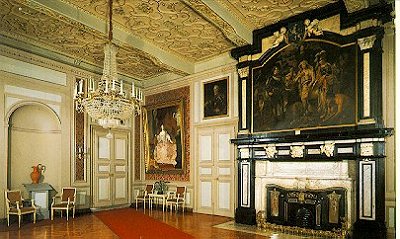Speech given by Guy Serraes, Alderman of Informatics
In Flemish and English. Reproduced with permission.

Ghent City Hall reception
Ontwerp van toespraak door de heer Guy Serraes, Schepen van Personeelsbeleid en Informatica, ter gelegenheid van de begroeting van de deelnemers aan de workshop “Psychology of Programmers Interest”, op 10 april in het Stadhuis.
Dames en Heren,
Eerst en vooral wil ik u allen van harte welkom heten in deze historische zalen van ons eeuwenoude stadhuis, die ongetwijfeld in scherp contrast staan met het modern karakter van de onderwerpen die tijdens uw jaarlijkse workshop dan bod komen.
Het is voor mij, als beleidsverantwoordelijke voor onder meer het informaticabeleid van het stadsbestuur, een eer en een oprecht genoegen u hier te mogen begroeten. Ik hoop trouwens dat u tussen uw drukke werkzaamheden de tijd zult vinden om uitgebreid kennis te maken met onze stad.
Ladies and Gentlemen,
On behalf of the Mayor and my fellow Aldermen, it is a great honour and a sincere pleasure for me to welcome you in our city. We are convinced that, already upon a first acquaintance, Ghent will show itself as a city with an impressive historic heritage.
Of the wide spectrum of historic tourist sights in the inner city, numerous highlights can be mentioned: the medieval Count’s Castle, the proud Belfry, the narrow and winding Patershol district and not in the least the grand Saint-Baafs Cathedral, in which the wealth of Flemish art is crystallised in the retable of the Mystic Lamb.
But, being a city of contrasts, the interest of the authorities of this historic city for technological innovations is very large. This is already made apparent by the presence and the success of Flanders Technoland, the international technology fair organised every two years, that will take place the forthcoming week. This exhibition exercises a great power of attraction upon high-tech industries. And from that point of view, the University of Ghent and the City Council have set up a joint industrial center for high-technology companies.
It goes without saying that the City Administration as well is using modern, state of the art information technology. There is a wide area network linking some twelve local area networks with Unix and NT-servers and more than five hundred computers. In 1996 we will invest more than 100 million Belgian francs in new purchases and projects. There will–amongst others– be a huge effort to modernise the computer infrastructure of the Police Department.
Ladies and Gentlemen,
We see it as a role to use information technology as an enabler of change. In fact, we don’t want to misuse technology by reinforcing obsolete ways of thinking, merely by “throwing” computers in.
A few examples might illustrate this thought.
Shared databases for instance make it possible that information can be simultaneously consulted in as many places as needed, even if people are working in separate buildings. When information is captured on paper, only one person can use it at a time. By allowing one living document to exist in several places at once, distributed database technology can free a process from the artificial limitations of sequencing.
On the other hand administrations and companies relying on an old technology as mail to move their information, must sacrifice central management control in order to let people in the field make their own decisions. Telecommunication networks free us from this trade-off and let us reap the benefits of centralisation and decentralisation.
Ladies and Gentlemen,
The last few months, not one single day has passed without seeing on television or reading in newspapers and magazines what effects the new technologies linked with Internet will have on our lives. A lot of new buzzwords are dominantly present: the information super highway, the World Wide Web, Java, Cyberspace,…
The Web provides a simple access to a fast-growing, global information service, for both providers and consumers of information. Most people, even those with little experience of or affection for computers, find using a Web browser straightforward and unintimidating. The Web has been described as making the technology invisible it allows users to concentrate on the content of information, without having to think much about how to access it.
This is one of the great challenges for programmers.
Another challenge is the use of object-orientation, which for many years has been associated exclusively with a particular kind of programming language. Nowadays, object orientation has come to be interpreted more generally as a way of organising our thoughts about the world. In this way, OO provides a concept for indexing our knowledge, whether it is expressed in terms of rules, logic, functions, relational languages, neural networks, or something else. Object orientation thus provides a way for engineering any kind of system – regardless of how the system will be implemented.
Ladies and Gentlemen,
It is my view that if you can buy a technology, it is not new. And I subscribe the statement of Johan Cruyff, the Dutch football player, who was once asked what made him such a great player, and answered that he was exceptional “because I go where the ball is going to be, not where it is”.
This is why it is so important that information on the current research is exchanged as broadly as possible, which is precisely the goal of your workshop.
On behalf of the Board of Burgomaster and Aldermen, I welcome you once more in our city. We are convinced that you will be able to make promising contacts and it is our sincere wish that you may return home with a positive idea of Ghent.
Dames en Heren,
Tot slot wens ik de organisatoren–en dan denk ik in het bijzonder aan de professoren Koen Bertels en Bart De Decker van de universiteiten van Namen en Leuven en Philip Vanneste van de Katholieke Hogeschool Sint- Lieven–te feliciteren met de 8e editie van dit evenement.
En zoals gezegd wens ik alle deelnemers naast een aangenaaam verblijf in onze stad ook een bijzonder vruchtbare en leerrijke workshop toe.